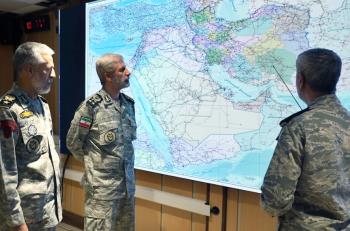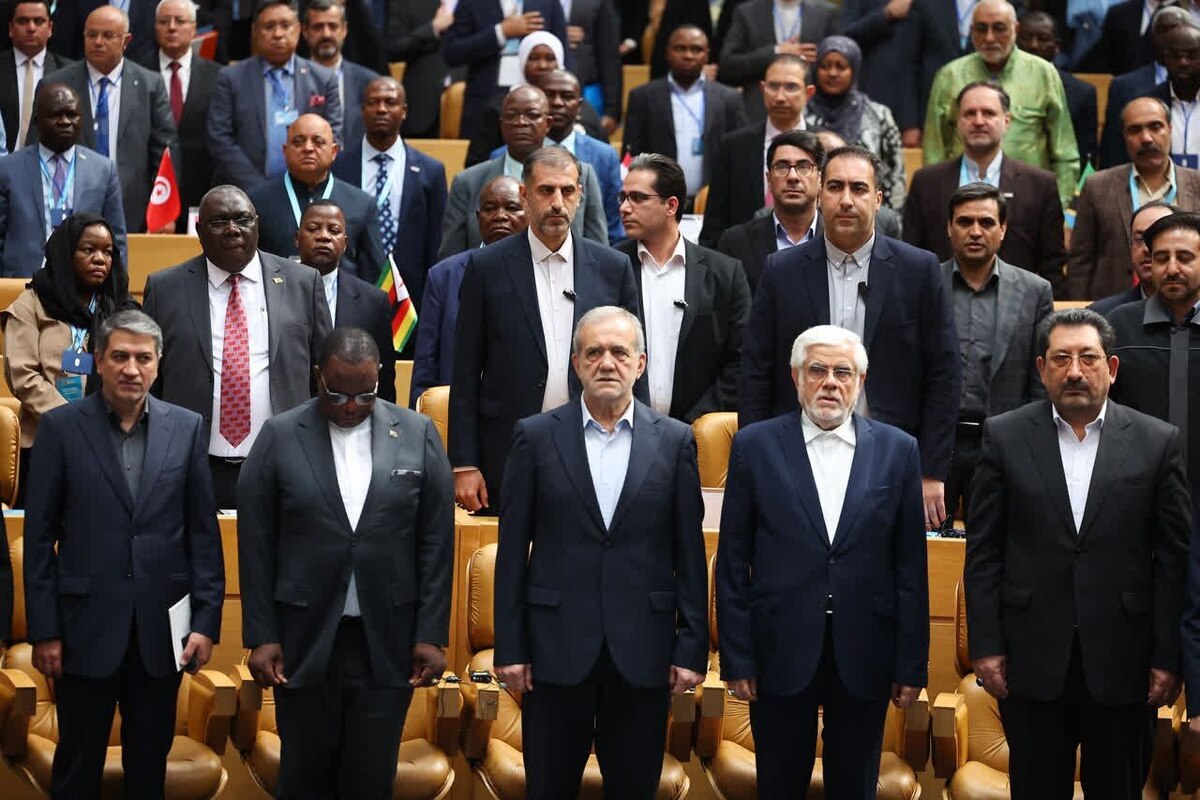Alwaght- The all-out expansion of relations with Africa is currently a key component of Iran's foreign policy. As part of this effort, one significant initiative has been the organization of regular Iran-Africa forums and meetings. So far, two such events have been held, with the third having begun on Sunday in Tehran, attended by prominent figures from various African countries.
At the forum, over 700 businesspeople from 38 African countries registered to attend. More than 50 high-level officials, including ministers and heads of chambers of commerce from 29 countries, arrived in Tehran for the event. Part of the summit took place from April 27 to 29 in Tehran, with the remainder scheduled for April 30 to May 1 in Isfahan.
During this event, four specialized panels will be held at the ministerial level in four areas: petrochemicals, mineral and metal industries, agriculture and food industries, and health and medicine.
The previous meeting of the Iran-Africa Economic Cooperation Forum was held in early May last year, during the last days of the government of late President Sayyed Ibrahim Raisi. During his three-year presidency, and with the special attention that President Raisi paid to boosting Iran-Africa cooperation in all aspects, the necessary steps were taken to advance relations between Iran and Africa. For example, in July 2022, President Raisi went on a historic trip to the three countries of Kenya, Uganda, and Zimbabwe, which was the first trip by an Iranian president to Africa after 11 years. This tour produced positive and significant achievements.
Forum aims
The main aims of the meeting of Iran and Africa include:
Expansion of trade and investment: One of Iran's most important goals in these meetings is to accelerate bilateral trade relations and investments.
Diversification of export markets: Given the international sanctions against Iran, one of the goals of these meetings has been to find new markets for Iranian goods and services, especially in Africa.
Infrastructure development: In many meetings, Iran, as one of the countries capable of providing services in various fields such as infrastructure, energy, agriculture and industry, has offered cooperation to African countries in these fields.
Strengthening political and economic relations: In many meetings, political and economic goals are involved, and strengthening bilateral and multilateral relations in various economic fields including trade, technology, energy, health and education has been among the priorities.
Moving towards $10 billion trade
These forums have considerably influenced the Iranian-African relations. Mohammad Atabak, Iranian minister of industry, mining, and trade on Sunday and during the opening of the forum pointed to the massive capacities of Iran-Africa partnership, saying that the two plan to enhance their trade ten folds to reach $10 billion.
Increased volume of economic relations in recent years: One of the positive results of these meetings has been the increase in the volume of Iran's trade with African countries despite the existence of sanctions. In recent years, Iran has been able to expand its trade with African countries by accessing new markets and increase its export volume in some sectors, especially in the industrial, oil, and agricultural fields. Iran has also launched numerous development and infrastructure projects in Africa, helping strengthen trade relations between the two sides.
Strengthening Iran's presence in the African market: These meetings have helped Iran strengthen its position in African markets, given its commercial and economic benefits. In areas such as energy supply, development projects, and technology transfer, Iran has entered new markets.
Familiarization with local potentials: These meetings have enabled Iran to better familiarize itself with the needs and potentials of African countries and to enter the markets of these countries in a more targeted manner.
Africa's economic potentials
Africa is a continent with 54 countries with an approximate area of 31 million squares kilometers, equal to 24 percent of the Earth area and three times the size of Europe.
Also, this continent, with a population of about 1.4 billion hosts more than 18 percent of the world's total population, which according to statistics, is the youngest continent in the world. On the other hand, the population growth rate in this continent is higher than in the rest of the world and has the fastest and largest rate in the world in terms of urbanization.
As one of the largest and fastest-growing markets in the world, Africa has great economic potential that can provide countless opportunities for Iran, especially in the fields of food, pharmaceuticals, electronics and industrial products.
In terms of natural resources, Africa also has 30 percent of the world's natural reserves, 40 percent of gold and 90 percent of chromium and platinum, and the largest reserves of cobalt, diamonds, platinum and uranium on the Earth are found in Africa. In addition, Africa has 10 percent of the world's renewable fresh water resources, 8 percent of natural gas resources and 12 percent of the world's oil reserves.
Main areas of Iranian presence in African market
Energy: Iran can play an important role as an energy supplier in Africa. Many African countries need technology and investment in oil and gas, renewable energy, and technology transfer in these areas.
Infrastructure and construction projects: Iran, as one of the countries with significant experience in infrastructure construction, can participate in large infrastructure projects in Africa.
Agricultural development: African countries are seeking to develop their agricultural sector and processing industries. Iran, with its experience in developing agriculture and food industries, can cooperate in the production and processing of agricultural products in Africa.
Technology and education: Iran, given its scientific and technical capacities, can have extensive activities in the fields of education and technology transfer to African countries.
Main goods Iran exports to Africa
Petroleum derivatives, including urea fertilizer, bitumen, liquefied petroleum gas, and various industrial oils, followed by steel and iron products, are the most important exports from Iran to Africa. In addition, food, construction materials, carpets and floor coverings, detergents and sanitary ware, household appliances, medicine and medical equipment, industrial supplies, auto parts, tires, minerals, electrical appliances, chandeliers, furniture, and toys are among the other goods exported by Iran to the African countries.
Main African products imported by Iran
Mineral products: Including gold, diamonds, copper, manganese ore, zinc ore and soil, grom concentrate and other metals.
Agricultural products: Food and agricultural products such as tea, corn, coffee, tobacco, legumes, sheep carcasses and fishery products, and 21 percent were mineral-like materials and 13 percent were mainly other.
Industrial products: Industrial oil and grease, various types of belts, machinery, industrial chemicals and spare parts
Key Iran economic partners in Africa
Most of Iran's trade with Africa is usually done with specific countries that have strong economic relations with Iran due to their economic potential, geographical location and trade needs. Among the top seven destinations for export products to Africa in 2023, Ghana with $173.5 million, South Africa $145 million, Tanzania $92.8 million, Kenya $48.7 million, Nigeria $48 million, Mozambique $47.1 million and Somalia $33.3 million are the top trade partners of Iran.
During this period, major imports from African countries also included South Africa with $19 million, Zambia with $12.5 million, Ghana with $12 million, Seychelles with $11.7 million, Kenya with $9.5 million, Tanzania with $6.1 million and Uganda with $4.1 million.
Largest African economies
Africa's largest economies based on GDP, size of natural resources, and industrial and commercial development in 2024 is as follows: South Africa ranked first with an estimated GDP of over $403 billion, the highest in Africa.
Egypt ranked second on the continent with a GDP worth around $380 billion, and Algeria ranked third with around $260 billion.
Next in line are Nigeria with a GDP of $199 billion, Morocco with $157 billion, Ethiopia with $145 billion, Kenya with $116 billion, Angola with $113 billion, Ivory Coast with $86 billion, and Tanzania with $79 billion.
Top Africa trade partners
After the African independence movement in the 1960s, the economic shape of the continent changed dramatically. The newly established countries not only maintained their historical relations with European countries, but also concluded trade agreements with American and Asian countries. As a result, the continent's GDP increased significantly.
According to reports, Europe, China and the US are Africa's main trade partners.
China remains Africa's largest trade partner, with trade volumes exceeding $300 billion per year. Chinese companies are heavily involved in infrastructure such as roads, railways and energy projects, but they also supply African markets with low-cost goods such as electronic components, machinery and clothing.
Among the countries of the West Asian region, Turkey's trade volume with Africa has increased tenfold in recent years, from $3.6 billion to $36 billion. According to Turkish officials, Turkish investment in the continent has exceeded $92 billion.
Also, the UAE is one of West Asian countries that has considerably expanded its economic partnership with Africa and according to The Finance World website, in the past five years, it has recorded a 87 percent increase in trade with Africa, reaching 235 billion dirham (about $64 billion).



























